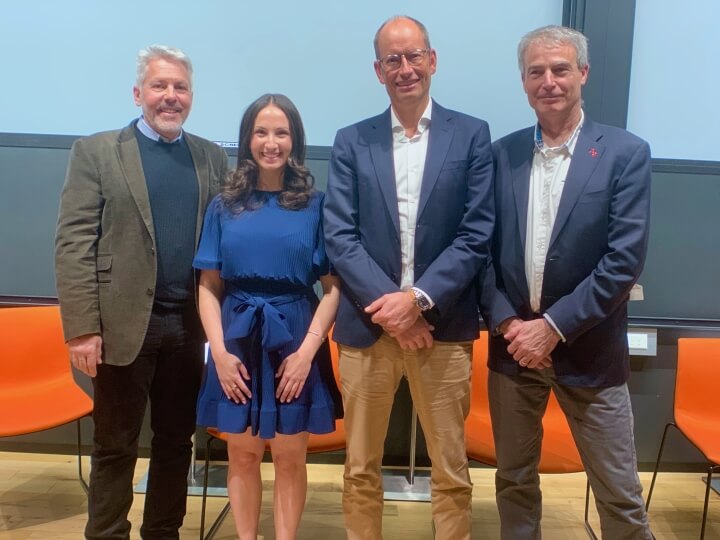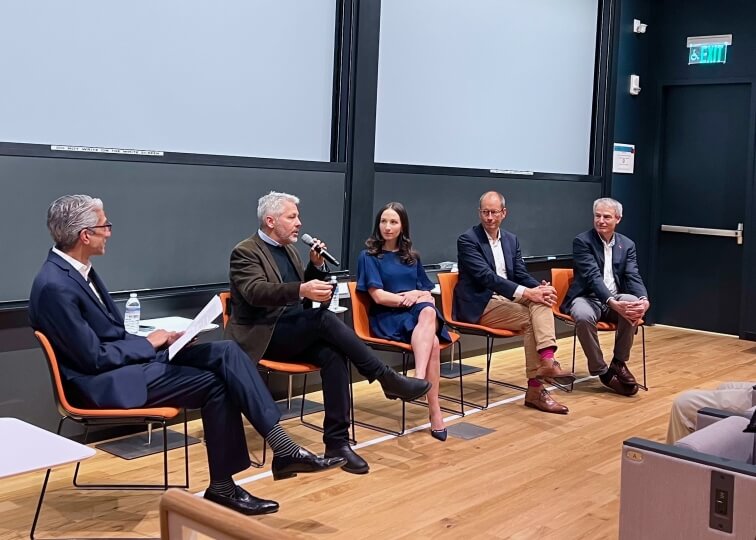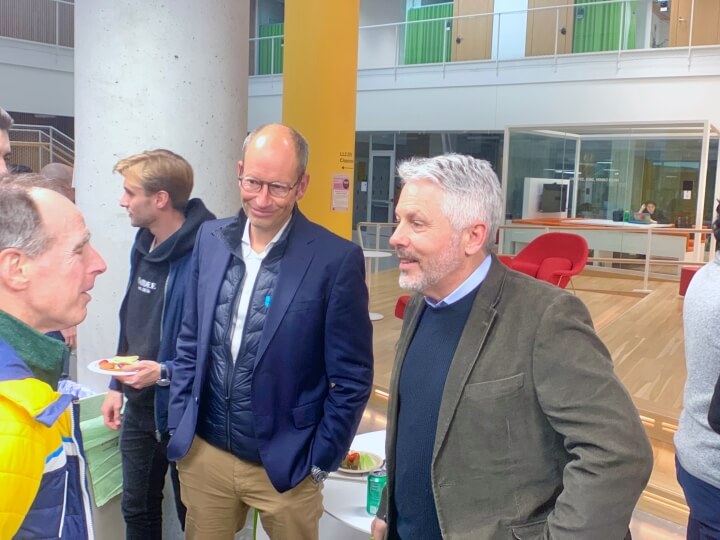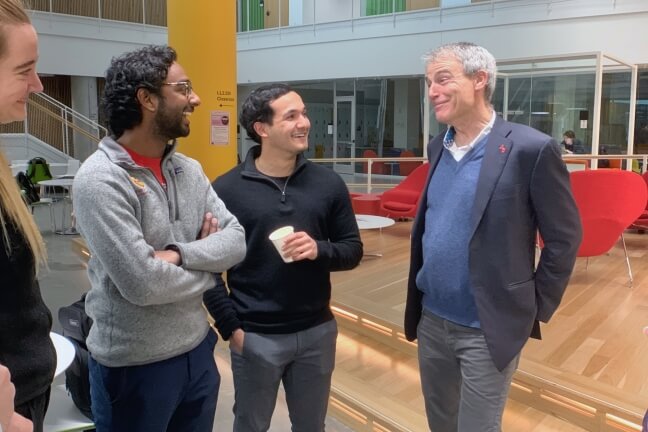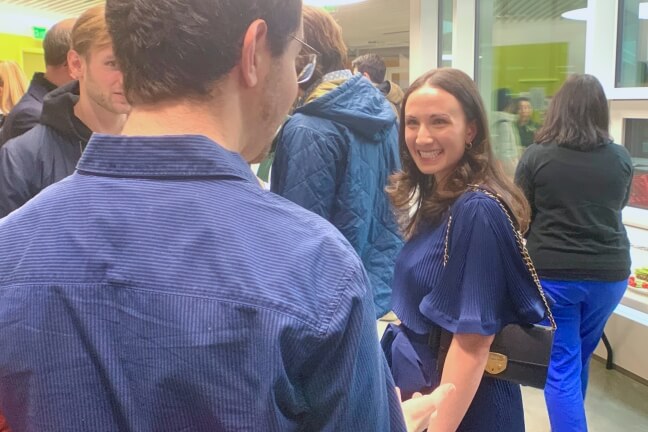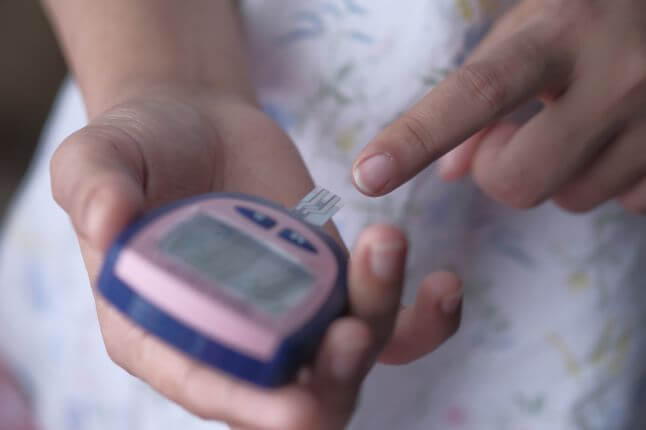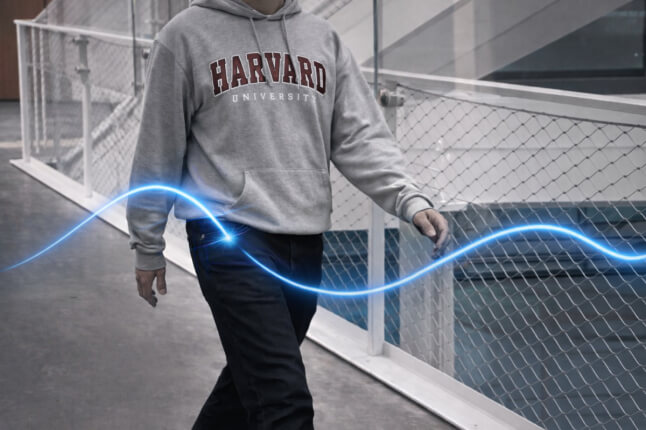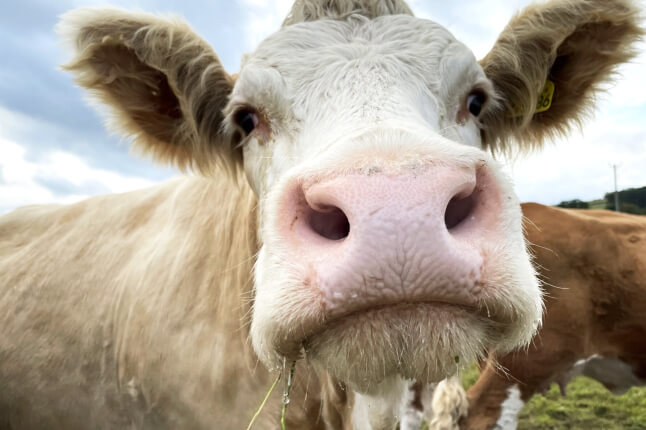News
The Biospectal team of Eliott Jones, A.B. '88, Natalie Meyer, Patrick Schoettker and Fred St. Goar, M.D. HMS '84 (Matt Goisman/SEAS)
Great things can happen when a desire to improve the world combines with creative invention. Eliott Jones, A.B. '88, wanted to do both those things when he co-founded digital health start-up Biospectal in 2017. Six years later, Jones’s company is helping to improve the health of low-income communities around the globe. Biospectal’s software converts a smartphone camera into a blood pressure monitor, making it much easier to diagnose and monitor hypertension, the largest chronic condition in the world with life threatening outcomes.
Students recently learned all about Biospectal through Industry Insights, an ongoing speaker series organized by the Harvard John A. Paulson School of Engineering and Applied Sciences (SEAS) at the Science and Engineering Complex in Allston. The Industry Insights series is a platform for industry speakers to share information and advice with our students and the SEAS community. The series helps broaden students’ perspectives into the possible pathways where their skills are needed in the world and provides insight into opportunities and challenges from an industry perspective.
“A mushroom cloud went off in my head about bringing an impact to the world of health with a device you have in every pocket around the world,” Jones said. “The idea of co-opting a smartphone camera for an unintended purpose, a sensor to measure blood flow beneath the skin and get blood pressure, is super exciting. We like to break models and invent new things.”
Harvard Grid Executive Director Paul Hayre, left, interviews the Biospectal team at a recent Industry Insights panel at the SEC.
Jones, Biospectal’s CEO, had spent decades working in user design and product experience in Silicon Valley before teaming up with Professor Patrick Schoettker to co-found Biospectal. Schoettker, Biospectal’s chief medical advisor, had spent just as long as an anesthesiologist at Lausanne University Hospital in Switzerland, and his experiences in the operating room inspired him to innovate.
“If you go into an operating room, there are cables everywhere,” Schoettker said. “They’re the lifeline between the patients and the monitors that display their vital signs. If you talk about the user experience in an operating room for surgeons and anesthetists, we always complain about the cables. My first goal was to get rid of the cables and identify a way to monitor vital signs and transmit them wirelessly. The use case was the operating room, but the real need for vital signs monitoring is outside the operating room.”
That desire to get out of the operating room to where patients live their lives inspired Biospectal, which makes it possible to track blood pressure without traveling to a hospital or even owning a blood pressurecuff. Studies have shown nearly 90 percent of the world’s population owns some kind of mobile phone, so adapting a commonplace technology to meet a medical need has the potential for a real impact in communities with limited access to advanced medical care. Hypertension can cause many cardiovascular diseases and is comorbid with a number of conditions including diabetes, so early detection and monitoring is essential to saving lives.
Biospectal co-founders Professor Patrick Schoettker and Eliott Jones, A.B. '88 chat with attendees at an Industry Insights panel at the SEC. (Matt Goisman/SEAS)
“Biospectal provides a powerful screening tool to get hypertensivesinto the medical system globally,” said Fred St. Goar, M.D. HMS '84, a cardiologist and Biospectal board member. “Especially in low resource settings, preeclampsia and maternal hypertension is a serious problem. When a woman is pregnant, her blood pressure can skyrocket. If it’s not picked up early, the implications for the infant at the time of delivery and the mother, pre and postpartum, are very significant.”
Schoettker added, “Hypertension is a silent killer. You might be chronically hypertensive and not know it because there are no symptoms, and then all of a sudden you have a stroke.”
Biospectal has already completed studies in communities in Bangladesh, Indonesia, South Africa and Tanzania in partnership with the World Health Organization (WHO). The studies demonstrated accuracy of OptiBP in pregnant and general populations.
“As an undergraduate I found my passion for global health. When I first discovered Biospectal, I I was working on a project in Kenya looking at hypertension and diabetes,” said Natalie Meyer, Biospectal’s director of strategic investment and partnerships. “I was doing interviews about how if you were diagnosed with hypertension, what were your solutions, and what you were doing after you were diagnosed. I asked if they were able to go back to the clinic to get their blood pressure taken, and the overwhelming answer was no. No one had a cuff at home, no one was going back to the clinic, no one was going back to the hospital, and by the time they were able to get checked again, it was too late. Everyone I interviewed had a phone, and every single person said if they could take their blood pressure directly on their phone, they would.”
Biospectal board member Fred St. Goar, M.D. HMS '84 chats with attendees at an Industry Insights panel at the SEC. (Matt Goisman/SEAS)
Natalie Meyer, Biospectal’s director of strategic investment and partnerships, chats with a student. (Matt Goisman/SEAS)
Along with helping more people, expanding to U.S. and European markets will also fund greater expansion into lower-resource settings. By establishing a market in higher-income countries and working with independent validation organizations like the WHO, Biospectal plans to build a financial infrastructure to cover the cost of access in other parts of the world.
“When we went to the WHO, one of the first things we agreed to was to make our software accessible and affordable for their donor states in perpetuity,” Jones said. “Our business model creates synergies between low- and high-income markets. Also, billions of data measurements create huge value in terms of global good for all populations, by enabling continuous improvement via AI. Our mission is to make an impact in global health for everyone, and software in devices already in pockets around the world can make that happen.”
The company is now going through the certification process in Europe and the United States. The goal is to market directly to consumers through mobile app stores and integration with a variety of healthcare partners.
“Once we launch it in the consumer space, we expect huge adoption,” Jones said. “But in parallel, we’re forming very strong partnerships in the healthcare delivery chain through insurance, telehealth platforms and other partners with whom we can integrate.”
Topics: Bioengineering, Entrepreneurship, Health / Medicine
Cutting-edge science delivered direct to your inbox.
Join the Harvard SEAS mailing list.
Press Contact
Matt Goisman | mgoisman@g.harvard.edu
